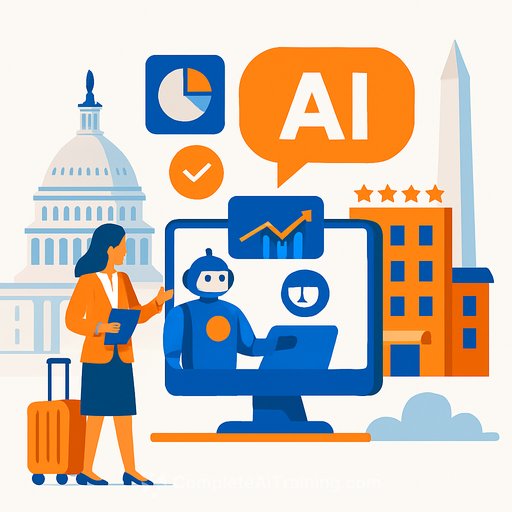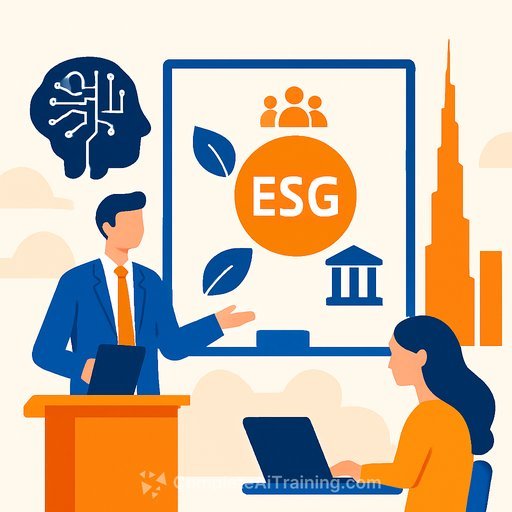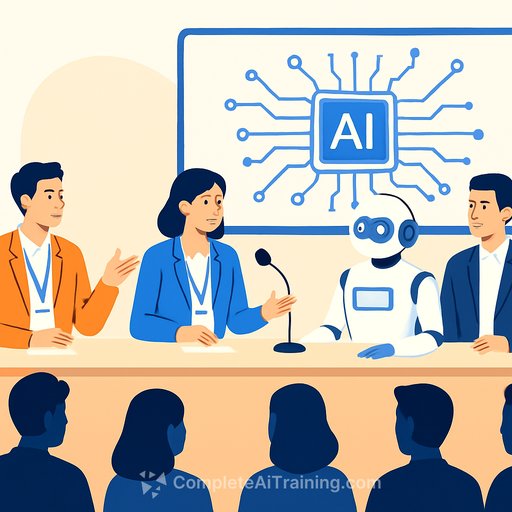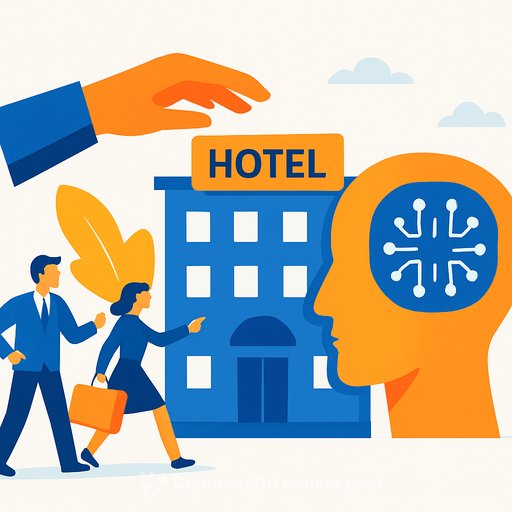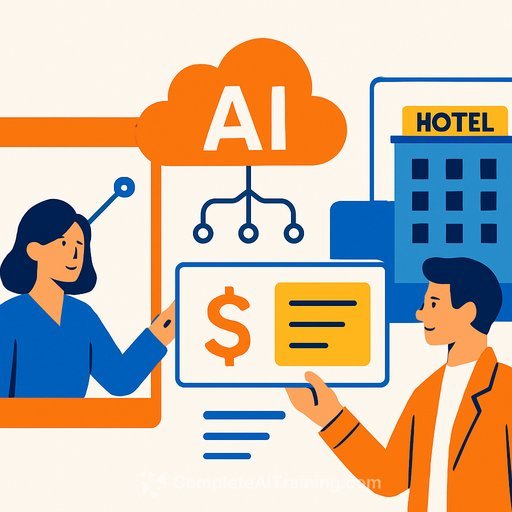Too Long; Didn't Read:
Washington, D.C. hotels should pilot AI-driven revenue management, guest personalization, and automation in 2025 to protect ADR and RevPAR during event-driven demand. The global AI in hospitality market is projected to grow from $0.23B in 2025 to $1.44B by 2029. Automation can reduce operating costs by 30–40% and improve productivity by 40–66%.
Washington hoteliers must prioritize AI because it influences key revenue and cost areas tied to government bookings, meetings, and events—critical sectors for the District. Local market swings due to policy changes make AI-driven tools essential for managing demand fluctuations. Pilots adding AI-powered revenue management, guest personalization, or contactless service can safeguard revenue metrics during peak weeks like inaugurations and conventions.
For teams ready to implement, practical upskilling helps turn analytics into actionable pilots rather than theory.
What is AI and Key Technology Trends in Hospitality for 2025 in Washington, DC
AI is not a single tool but a collection of technologies for Washington, D.C. hotels. These include natural language chatbots, recommendation engines, computer vision, robotics, and predictive analytics that forecast demand around events like inaugurations and conferences.
These technologies convert complex OTA data into actionable insights such as smarter staffing, upselling opportunities, and dynamic pricing that adjusts in real time. NLP-powered virtual concierges and chatbots reduce front desk workload while maintaining personal guest interactions. Machine learning improves revenue management across channels. IoT combined with AI enables smart rooms and energy management that cut costs without reducing guest comfort.
For concrete examples, resources like Acropolium’s ML and AI in Hospitality & Travel guide and NetSuite’s AI in Hospitality guide highlight benefits ranging from automated housekeeping to predictive maintenance.
Picture a guest arriving to a room already set with their preferred lighting and playlist—a small but memorable detail showing how AI turns data into guest satisfaction while protecting margins.
Key Technology Practical 2025 DC Use
- Natural Language Processing / Chatbots: 24/7 guest service and multilingual concierge for international delegations
- Predictive Analytics / Revenue Management: Dynamic pricing aligned with events, weather, and government schedules
- Computer Vision & Facial Recognition: Contactless check-in and enhanced venue security during conferences
- IoT + Smart Room Controls: Energy optimization and personalized in-room experiences
AI Industry Outlook for 2025: Market Size, Adoption Rates, and Regional Forecasts for Washington, DC
The AI in hospitality market is growing fast, with estimates varying by scope but all pointing to rapid adoption that will affect Washington, D.C. The Business Research Company projects growth from $0.15B in 2024 to $0.23B in 2025, with a compound annual growth rate (CAGR) near 58% through 2029.
Broader industry reports suggest the global market size will reach tens of billions by 2025, with North America leading adoption.
For D.C., this means AI-driven demand forecasting, dynamic pricing, and staffing optimization can turn unpredictable surges during peak government and conference weeks into measurable revenue gains. Converting noisy OTA data into clear action plans will help protect ADR and RevPAR.
Hotels piloting AI now will be better positioned for upcoming conventions and government events.
Market Forecast Summary
- 2024: $0.15B (AI in hospitality, Business Research Company)
- 2025: $0.23B (Business Research Company); $20.39B (Global AI in Hospitality & Tourism)
- 2029: $1.44B (Business Research Company); $50.86B (ResearchAndMarkets)
- CAGR: Approximately 30–58% depending on source and scope
Practical Use Cases of AI in Hotels in 2025 in Washington, DC
Washington hotels can apply AI to smooth event-driven demand and high-security travel. Virtual concierges and chatbots handle multilingual requests from international visitors while freeing staff for personal interactions.
Automated revenue management engines and real-time pricing tools capture last-minute government and conference bookings, protecting ADR. Predictive housekeeping schedules and service robots speed room turnover during convention peaks.
Smart-room IoT links guest preferences like temperature and lighting to loyalty profiles. VR tours and mobile-first booking optimize last-minute sales. Behind the scenes, AI predicts maintenance needs and manages inventory, reducing waste.
These tools help manage chaotic surges into consistent, high-quality guest experiences. Imagine a busy convention weekend where dynamic pricing, automated housekeeping, and personalized smart rooms all work seamlessly to welcome priority guests.
How to Start: Data Foundations, Vendor Vetting, and Pilot Projects for Washington, DC Properties
Begin by mapping your data sources—PMS, booking engines, CRM, loyalty programs, and feedback systems. Prioritize linking the PMS and CRM to keep guest profiles updated in real time and provide staff with relevant context during check-in.
When vetting vendors, focus on those with proven hospitality integrations (PMS, RMS, POS), strong identity resolution and deduplication, plus rigorous privacy and compliance controls.
Run small, measurable pilots such as segmented pre-arrival upsells or automated housekeeping schedules tied to arrivals. Assign ownership across IT, revenue, and marketing teams. Define success with clear KPIs like campaign ROI, conversion rates, and profile accuracy.
This approach turns data hygiene into memorable guest moments, such as greeting a returning guest with a preferred room view and late checkout, without adding staff workload.
Workforce, Governance, and Responsible AI Adoption in Washington, DC Hotels
Effective workforce policies and governance distinguish AI projects that boost revenue from those that create legal or operational risks. Following frameworks like the NIST AI Risk Management Framework helps hotels codify policies, assign executive ownership, and maintain an AI system inventory.
Large operators have adopted governance standards that support responsible AI pilots. Washington hotels can start small by documenting impact assessments and scaling training across front-desk, revenue, and IT teams.
Key governance actions for D.C. hotels:
- Policy & Standards: Adopt documented AI governance before guest-facing pilots
- Roles & Training: Assign executive ownership, define AI roles, and conduct role-based risk training
- Inventory & Monitoring: Maintain AI system inventories, perform impact assessments, and require transparency from third-party vendors
Training, Education, and Events: Places Washington, DC Hoteliers Can Learn AI in 2025
Washington hoteliers can choose from practical options to build AI skills in 2025. eCornell offers a hospitality-focused online AI certificate covering predictive models, prompt engineering, and building virtual assistants. This three-month course requires 3–5 hours per week.
Alternatively, the on-campus Executive Program at Cornell Nolan School (June 9–14, 2025) offers an intensive week with panels and case studies. Shorter live virtual sessions like "Leveraging AI for Hospitality Operations" provide hands-on practice with prompt crafting and no-code workflows.
These educational options combine immediate skill application—such as automating review responses or deploying virtual concierges—with networking opportunities and industry insights.
Choose the right path based on your team’s needs and availability.
Training Programs Overview
- eCornell AI in Hospitality Certificate: Online, 3 months, 3–5 hrs/week, tuition approx. $3,900 (discounts may apply)
- AI in Hospitality - On-Campus Executive Program (Cornell Nolan School): Ithaca, June 9–14, 2025, $6,999 (participants cover travel)
- eCornell Leveraging AI for Hospitality Operations: Live virtual immersion, next cohort starts Sept 3, 2025
Vendor Landscape and Notable Vendors to Evaluate for Washington, DC Hotels in 2025
When selecting AI vendors, prioritize those who understand Washington’s event-driven and policy-sensitive market. Start with analytics and market intelligence firms capable of modeling demand fluctuations such as a 20% drop in government per-diem bookings or spikes during events like WorldPride.
Look for vendors with recent D.C. case studies or experience managing heavy convention calendars. They should be willing to run small, measurable pilots—on pricing, housekeeping cadence, or guest profile personalization—before full implementation.
In a market where a single event can add hundreds of thousands of room nights, the right partner turns unpredictable surges into consistent revenue opportunities.
Measuring ROI and KPIs for AI Projects in Washington, DC Hospitality
Focus on tangible, repeatable metrics when measuring AI project ROI. Track staff time saved, guest satisfaction, conversion lifts, and direct revenue impact rather than broad or vague indicators.
Run time-boxed pilots—such as virtual concierge deployments or automated upsell campaigns—and measure changes in check-in time, offer conversion rates, and Net Promoter Scores. Use control groups and pre/post comparisons for accuracy.
Consider the first 12–24 months as a tuning phase rather than a one-off investment.
KPI Measurement Examples
- Time Savings: Log staff hours before and after automation
- Productivity Lift: Measure task completion times and throughput
- Customer Satisfaction: Track NPS and post-stay survey changes
- Pilot Success: Monitor conversion rates, retention, and model update frequency
Conclusion: Next Steps for Washington, DC Hoteliers Adopting AI in 2025
To move from planning to action, hoteliers should:
- Choose one high-impact, measurable pilot (e.g., pre-arrival upsell or automated housekeeping cadence), assign cross-functional owners, and set KPIs such as conversion rates and time saved.
- Invest in practical AI skills for your team through courses like the Nucamp AI Essentials for Work (15 weeks) or other available options.
- Attend local industry events like the Destination AI Hospitality Summit in Washington, D.C. on September 30, 2025, to access operator case studies and vendor demos that accelerate pilot launches and vendor selection.
Start small, measure carefully, and leverage local training and events to build a successful AI playbook that protects revenue during peak convention seasons.
Frequently Asked Questions
Why should Washington, D.C. hoteliers care about AI in 2025?
AI is reshaping revenue and cost drivers critical to D.C., such as government bookings and events. It enables dynamic pricing, demand forecasting, automation, and personalization that improve operating efficiency and boost revenue.
What AI technologies and practical use cases should D.C. hotels prioritize in 2025?
Focus on NLP chatbots and virtual concierges for 24/7 multilingual guest service, predictive analytics for dynamic pricing, computer vision for contactless check-in and security, IoT smart-room controls for energy savings, and back-of-house automation like predictive maintenance and inventory forecasting.
How should a Washington property start implementing AI?
Begin with data foundations by mapping guest data sources and linking PMS with CRM for real-time profiles. Vet vendors based on hospitality system integrations, identity resolution, and privacy compliance. Run small, time-limited pilots with cross-functional ownership, clear success metrics, and governance policies.
How do Washington hotels measure ROI and which KPIs matter for AI pilots?
Measure ROI with clear metrics like time saved, productivity improvements, guest satisfaction (NPS), and revenue impact. Use control groups and pre/post comparisons, and view the first 1-2 years as an optimization phase.
Where can D.C. hoteliers get training, meet vendors, and accelerate adoption in 2025?
Options include practical online courses and certificates, live virtual workshops, and local events such as the Destination AI Hospitality Summit. Combining team education with vendor vetting and industry networking speeds pilot success.
Your membership also unlocks:

